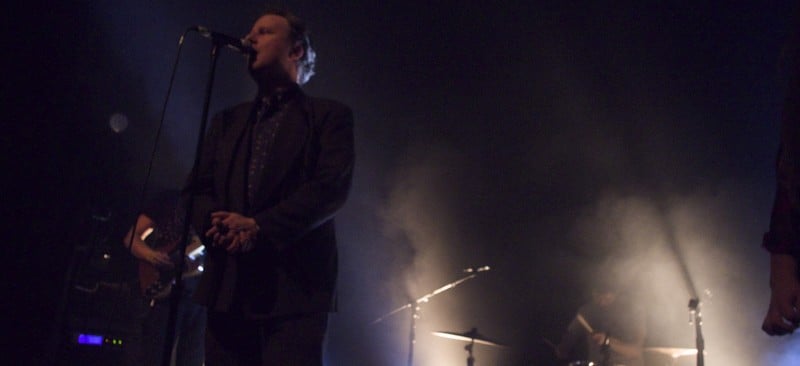[slideshow_deploy id=’8588′]
A crowd slowly built in Lincoln Hall in anticipation for Detroit post-punks Protomartyr—but it took a while. It was a slow burn coming, as the first band Turn to Crime, who seemed made up of weird uncles, played unmemorable synth-injected tunes to a measly crowd of less than twenty. Varsity, a Chicago version of young Australian jangly pop band San Cisco headed by a girl channeling her inner Lauren Mayberry from Chvrches, injected the crowd with a friendly energy that was infinitely multiplied—and debatably reversed to furious energy—when Spider Bags stumbled on stage. Quick bursts of anger, rapid fire song explanations and leaden guitar was accentuated by beads of sweat pooling on stage, assertive choreographed kicks from the bass player and lead singer, and a couple dancing wildly in an otherwise tame crowd.
When it was finally time for Protomartyr’s set, vocalist Joe Casey strolled on stage, lazily holding a can of beer and looking at the crowd with a seemingly mild contempt. He wore a suit jacket, pants stuffed in a pair of hefty rubber boots.
“Even though this is Chicago, it’s still good to be here,” he said, drawling, and playing on the deep Midwestern baseball riff between the White Sox and Detroit Tigers. Although Casey stood on stage bearing little physical emotion and standing casually still as if waiting for the bus, the vibe was tense, black-water deep and aggressive—and everyone loved it. Liken it to Casey having an intimate conversation with each person about family issues and alcoholism, albeit oozing spite. The lack of movement on stage, save for bassist Scott Davidson shaking his long golden locks, was challenged by the crowd’s emerging moshers midway through the show.
Barreling through songs off the band’s first albums and most recent release, “Under Color of Official Right,” Casey loomed ominously on “Violent” and snarled his way through “Scum, Rise!” In an uncharacteristic move, Protomartyr took the stage for an encore.
“We’re gonna do one old sh—y song and that’s it,” said Casey. He claimed the Tomorrow Never Knows crowd was getting a rare extra performance and possibly experiencing the longest set in the band’s career, clocking in at 55 minutes—well worth any wait


